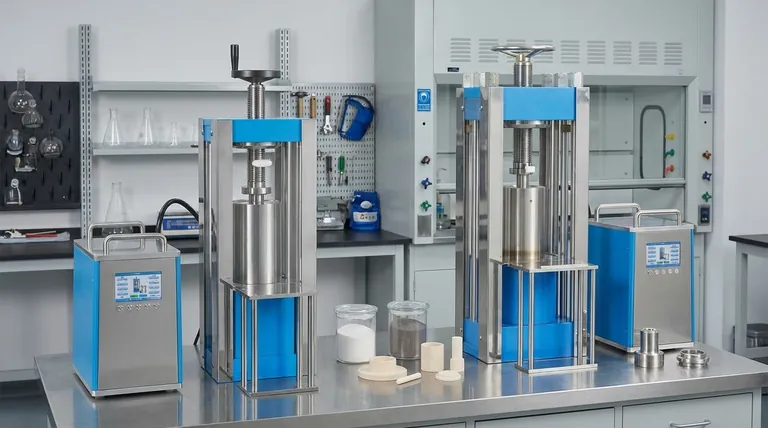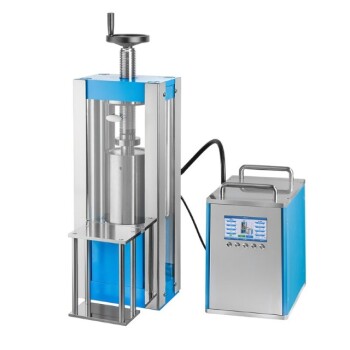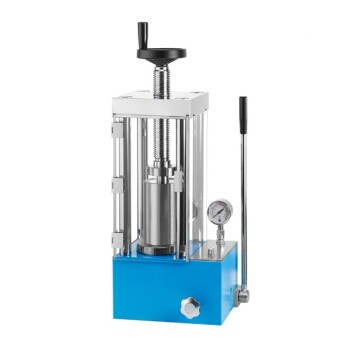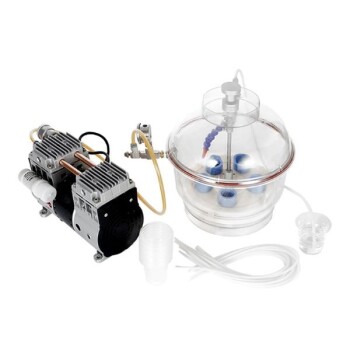In essence, cold isostatic pressing (CIP) is a powder compaction method used to create solid, uniform objects from various materials before they undergo final sintering or processing. Its applications range from forming high-performance ceramics and refractory metals to consolidating graphite, specialty metal filters, and even sterilizing products in the food and medical industries.
The core value of cold isostatic pressing is not simply the parts it produces, but the unparalleled material uniformity it achieves. It is the go-to method when consistent density and strength are critical, especially for parts with complex geometries or large sizes that are impractical for traditional pressing methods.

Why CIP is Used: The Principle of Uniform Pressure
Cold isostatic pressing solves a fundamental problem in powder metallurgy and ceramics: uneven density. Unlike traditional methods that press from one or two directions, CIP applies equal pressure from all sides simultaneously.
How Isostatic Pressure Works
In the CIP process, a powder is sealed in a flexible mold. This mold is then submerged in a fluid-filled high-pressure chamber. As an external pump pressurizes the fluid, this pressure is transmitted uniformly to every surface of the mold, compacting the powder inside.
This is fundamentally different from uniaxial pressing, which acts like a piston, often creating denser regions closer to the punch and weaker areas further away.
The Chief Advantage: Uniform Density
By applying pressure equally from all directions, CIP eliminates the density gradients common in other methods. This results in a homogenous "green" part (an unsintered component) with uniform strength and predictable shrinkage during the subsequent sintering phase.
Enabling Complex and Large Geometries
Because CIP uses a flexible mold rather than a rigid steel die, it is exceptionally versatile. This makes it ideal for producing parts that are either very large (like refractory blocks) or have complex shapes (like nozzles or custom tools) that would be difficult or impossible to eject from a traditional die.
Key Application Areas by Material
The unique benefits of CIP make it the preferred choice for a wide range of demanding materials and components.
Advanced Ceramics & Refractories
CIP is heavily used to consolidate brittle materials where internal flaws can lead to catastrophic failure. Uniform density is non-negotiable for these applications.
Examples include ceramic insulators, refractory nozzles, crucibles, and advanced technical ceramics like silicon carbide, silicon nitride, and boron carbide.
Powder Metallurgy and Hard Metals
In powder metallurgy, CIP is used to form preforms from materials that are difficult to machine. It is a critical step in producing cemented carbides, tool steels, and components from high-melting-point metals. It is also used to manufacture porous metal filters with consistent permeability.
Graphite and Specialty Components
The process is ideal for creating isotropic graphite, where material properties need to be identical in all directions. Other niche applications include forming plastic tubes and rods, and even creating artificial bones where uniform porosity and strength are vital.
Understanding the Trade-offs
While powerful, cold isostatic pressing is not a universal solution. Understanding its limitations is key to using it effectively.
Precision and Tolerances
CIP is a near-net shape process. While the shape is well-defined, it does not typically achieve the tight dimensional tolerances of high-precision machining. Parts often require final machining after sintering to meet exact specifications.
Cycle Time and Throughput
The process of loading the mold, placing it in the pressure vessel, running the pressure cycle, and unloading is inherently slower than automated uniaxial pressing. CIP is therefore better suited for low-to-mid volume production runs or prototypes.
Tooling and Setup
While CIP avoids the extremely high cost of hardened steel dies, the flexible molds have a limited lifespan and require careful design. The upfront investment in the high-pressure vessel and pumping system is also significant.
Making the Right Choice for Your Project
Selecting CIP is a strategic decision based on the final properties your component requires.
- If your primary focus is uniform material properties: CIP is the superior choice for components like isotropic graphite or advanced ceramics where consistent strength is critical.
- If your primary focus is producing large or complex shapes: CIP offers design freedom for parts like large refractory blocks or intricate nozzles that are not feasible with other pressing methods.
- If your primary focus is cost-effective prototyping or low-volume runs: CIP is ideal when the high cost of a traditional pressing die cannot be justified for the production quantity.
Ultimately, selecting cold isostatic pressing is a decision to prioritize material integrity and design flexibility over raw production speed.
Summary Table:
| Application Area | Key Materials & Components |
|---|---|
| Advanced Ceramics & Refractories | Ceramic insulators, silicon carbide, crucibles, nozzles |
| Powder Metallurgy & Hard Metals | Cemented carbides, tool steels, porous metal filters |
| Graphite & Specialty Components | Isotropic graphite, artificial bones, plastic rods |
Need to produce complex parts with superior material uniformity?
KINTEK specializes in lab equipment and consumables, serving laboratory needs with precision cold isostatic pressing solutions. Whether you're working with advanced ceramics, refractory metals, or specialty components, our expertise ensures consistent density and strength for your most demanding projects.
Contact us today to discuss how CIP can enhance your material integrity and design flexibility!
Visual Guide

Related Products
- Electric Split Lab Cold Isostatic Press CIP Machine for Cold Isostatic Pressing
- Electric Lab Cold Isostatic Press CIP Machine for Cold Isostatic Pressing
- Automatic Lab Cold Isostatic Press CIP Machine Cold Isostatic Pressing
- Manual Cold Isostatic Pressing Machine CIP Pellet Press
- Manual High Temperature Heated Hydraulic Press Machine with Heated Plates for Lab
People Also Ask
- How does a cold isostatic press contribute to the formation of TZC molybdenum alloy green bodies? Key Densification Tips
- What is the isostatic pressing method? Achieve Uniform Density and Superior Material Performance
- Why is a cold isostatic press (CIP) required after Li/Li3PS4-LiI/Li battery assembly? Optimize Your Solid-State Interface
- How does Cold Isostatic Pressing (CIP) benefit SiC ceramic reactors? Achieve Flawless Material Integrity
- What is cold isostatic pressing? Achieve Uniform Density for Complex Parts
- What advantages does Cold Isostatic Pressing (CIP) offer for nickel-alumina composites? Enhance Density & Strength
- How does an isostatic work? Achieve Uniform Density and Complex Shapes with Isostatic Pressing
- Why is a cold isostatic press (CIP) required after uniaxial pressing? Maximize LLZO Density & Performance



















